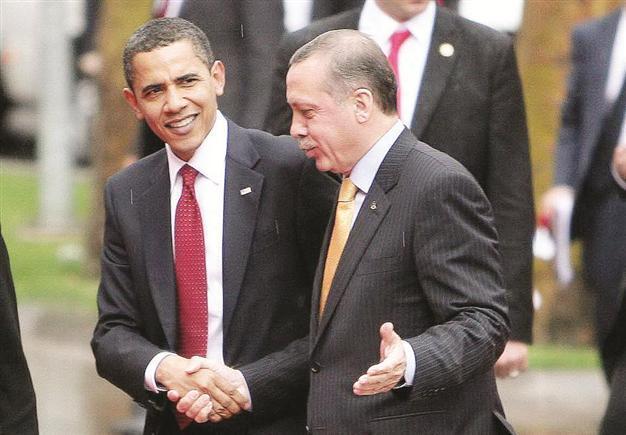Economy to make mark in PM Erdoğan’s US visit
ISTANBUL

Turkish Prime Minister Recep Tayyip Erdoğan and US President Barack Obama shake hands during US president’s visit to Turkish capital of Ankara in this 2009 file photo. Erdoğan has left for the US yesterday for a four-day visit. DAILY NEWS photo, Selahattin SÖNMEZ
The transatlantic free trade talks and energy issues, particularly Turkey’s oil imports from northern Iraq, will be on the table during Turkish Prime Minister Recep Tayyip Erdoğan’s United States visit, which started yesterday, and his meeting with U.S. President Barack Obama.While heated political topics are likely to dominate the agenda - as the crisis in Syria has escalated and Israel-Turkey and Israel-Palestinian relations are on the stage with Erdoğan’s upcoming Gaza trip - the economic agenda still isn’t likely to be set on the sidelines.
In addition to Economy Minister Zafer Çağlayan and Energy Minister Taner Yıldız, who were not in the initial delegation list and were added at the last minute, 90 businesspeople are accompanying the prime minister in the U.S., which is evidence of the significance of the economic aspect of the visit.
The heads of Turkish business organizations including the Union of Chambers and Commodity Exchanges of Turkey (TOBB) and the Turkish Industry and Business Association (TÜSİAD), and prominent bosses, will be making contacts with their American counterparts alongside the politicians.
Free trade talks
The Transatlantic Trade and Investment Partnership (TTIP) talks that the European Union and United States have agreed to kick-off will top the agenda, as Turkey has been increasingly pushing to get involved in the talks. The Customs Union agreement that was signed in 1996 between the EU and Turkey is the reason behind Ankara’s urging, as the union deal enables third parties that the EU has lifted trade barriers with to enjoy free trade with Turkey as well, but leaves the choice of providing the same condition for Turkey to their own initiative.
Turkish authorities and businesspeople estimate that a possible EU-U.S. free trade deal excluding Turkey would cause a 2.5 percent contraction in growth and leave exporters struggling to compete against cheap EU products.
Turkey has been pushing the conditions through two branches: it is seeking either a separate and parallel free trade agreement with the U.S., or is calling on the EU to reconsider the terms of the deal.
In particular, U.S. officials have been trying to assure Turkey that it will be considered during the talks, but as there haven’t been any precise steps taken, Turkey remains concerned.
In the European corner, the authorities have been more distant. Although they have not suggested they will oppose a scheme including Turkey somehow, they act like the matter is simply between Turkey and the third party, in this case the U.S.
Another hot economic topic will be the booming oil trade between Turkey and the Kurdish Regional Government (KRG) in northern Iraq, which irks the Baghdad authority and is increasing U.S. fears of Iraq splitting up.
In particular, the two parties’ plans to build an oil pipeline between the KRG and
Turkey have seen objections from the U.S., which fears the project could contribute to the breakup of Iraq.
Baghdad says it alone has the authority to conduct exports and sign contracts, while the KRG says its right to do so is enshrined in its federal Constitution and that the U.S. shares its concerns.
Energy resources explored in the Eastern Mediterranean which are expected to be a game-changer in the region might also come up during the meetings.
















